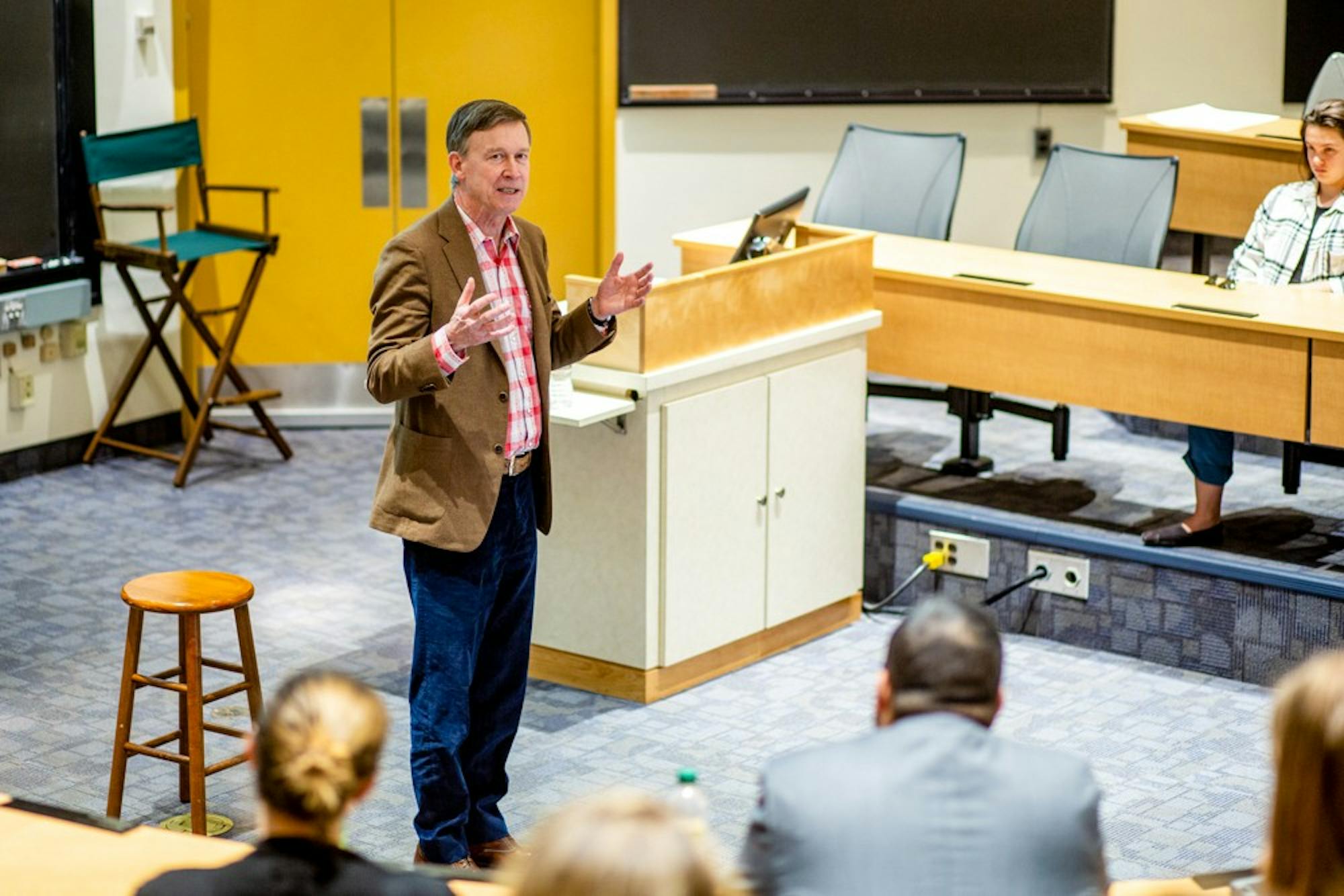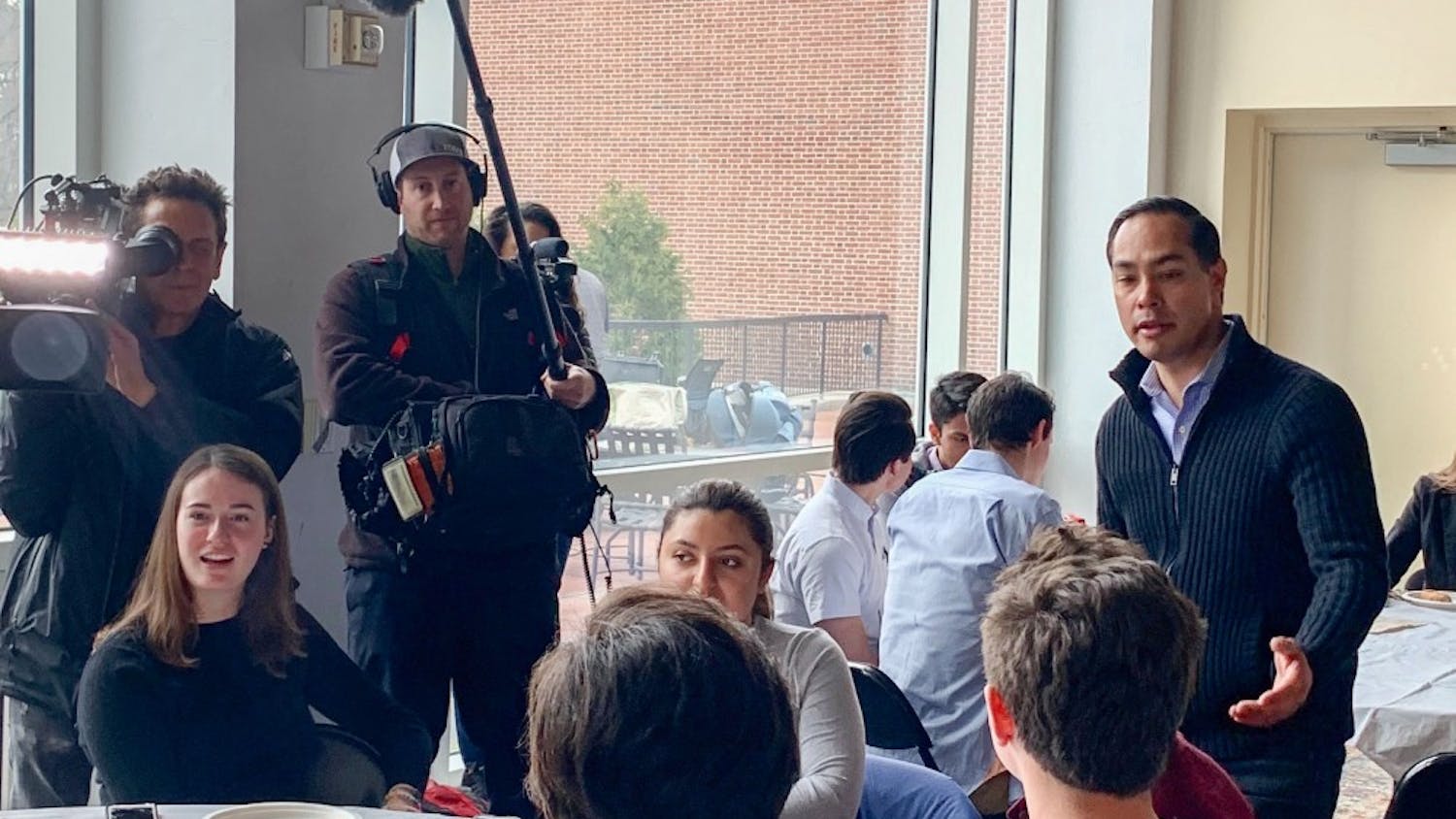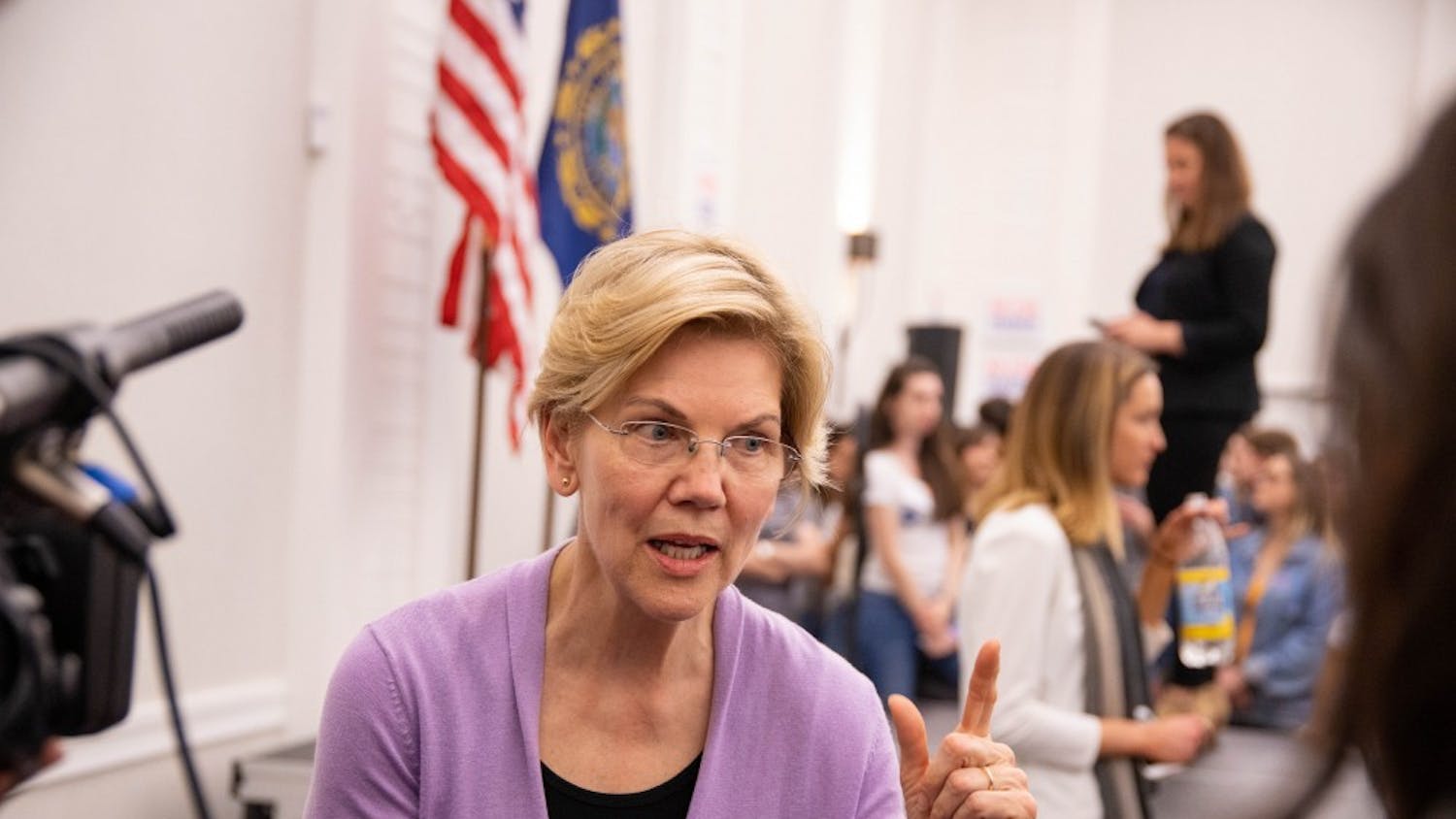Former Colorado governor and Democratic presidential candidate John Hickenlooper spoke at the Tuck School of Business to around 50 undergraduates, graduate students and community members on Saturday. In the talk — titled “The Future of Capitalism” — and the subsequent question and answer session, Hickenlooper discussed a series of policies that he said would help address the “problems” in capitalism as an economic system in the United States.
Hickenlooper’s proposals, rooted in the more market-friendly wing of the Democratic Party, contrast sharply with ideas for more radical change from progressive Democrats such as Sen. Bernie Sanders (I-VT) and Sen. Elizabeth Warren (D-MA), the latter of whom held an event in Hanover in April. The purple state governor shunned progressive policies such as Sanders’ “Medicare for All,” Warren’s wealth tax and Rep. Alexandria Ocasio-Cortez (D-NY)’s “Green New Deal” in favor of more moderate plans: a public health insurance option, cutting spending through attrition of federal workers, and streamlining the construction of carbon-free power plants.
Despite being on the campaign trail since early March, Hickenlooper has yet to earn more than one percent in any New Hampshire Democratic primary poll since February. Nationally, he has not broken two percent, but has earned enough support in enough polls to qualify for the Democratic National Committee’s first debate in late June.
Hickenlooper served two terms as mayor of Denver and two terms as governor of Colorado. Executive director of Tuck’s Center for Business, Government and Society John McKinley said in his introduction that when Hickenlooper left office in Colorado, the state had the top economy in America for two years running according to U.S. News and World Report.
The governor emphasized his combination of private and public sector experience as qualifications for the presidency. Prior to entering politics, he first had a career as a geologist until he was laid off. He and his friends then opened a brewing company that expanded within Denver before he sold his stake in it. Hickenlooper tied his success to economic conditions that existed then, but he noted that the current economy may not foster the same opportunities.
“There was a sense that the system [was] open to an entrepreneur,” Hickenlooper said. “I’m not sure that’s true anymore.”
The governor described what he saw as “broken” in the American economy. He noted that since 1981, roughly half of Americans’ wages have stagnated in inflation-adjusted terms, which he said hurts the middle class. Hickenlooper blamed this phenomenon on a combination of “trickle-down” economics and deregulation, as well as rising costs of housing and health care. He called for taking an “entrepreneurial approach” to solving these problems.
“That’s what I think we really have to do to rehabilitate capitalism,” he said.
In terms of specific policies, Hickenlooper called for phasing in a national $15 minimum wage over several years and creating a “sliding scale” for supporting parents that need child care. He also panned “industries that are dominated by two or three or four corporations,” arguing that this hurts job creation and entrepreneurship.
In a contrast to other Democratic candidates, Hickenlooper emphasized that lobbyists, especially for trade associations, are “not bad people.” He said that their efforts to gain tax breaks and subsidies for their industries, however, are damaging to the economy.
“Over a long period of time, [efforts to gain tax breaks and subsidies have] ... provided layer after layer after layer of economic advantage for corporations and has put working people at a disadvantage,” Hickenlooper said. He also lamented the nationwide decline in union membership.
Throughout the talk and the Q&A, the governor sought to portray himself as a policy wonk interested in bringing different sides together. He characterized his proposals as policies that his team had examined, but he acknowledges counterarguments to his ideas.
When asked about immigration, Hickenlooper offered a proposal that contained elements of liberal and conservative ideas. He called for a fully secure border, a nationwide, counterfeit-proof ID system for citizens and a tripling of penalties for businesses that employ undocumented workers. At the same time, he called mass deportations “laughable” and proposed giving renewable 10-year visas to every undocumented immigrant without a criminal record.
“Right now, we, all of us, need them,” Hickenlooper said, emphasizing the role undocumented workers play in industries like agriculture and construction.
On climate change, Hickenlooper emphasized his ability to bring together industrial and environmental groups. He told an anecdote about working as a go-between for an organization looking to stop methane emissions and an industry group. After discussions with both, he said he found out that both sides were simply concerned with who would get credit for the emission cuts — so his administration ensured both groups were credited.
“We gotta go [take action on climate change] right now, and we’re not going to win by having people fighting,” Hickenlooper said. “We’re going to win by getting market forces and explaining why it’s in everyone’s advantage to do this.”
Calling basic health care a human right, Hickenlooper proposed a public insurance option in competition with private insurance companies but dismissed “Medicare for All” as damaging to Americans satisfied with their private insurance.
“In this country, we don’t go and take stuff away easily,” he said.
He said that the buy-in for the public option would be on a sliding scale based on income and could be implemented through the Medicare system. He also called for more transparency in hospital pricing and partnerships with pharmaceutical companies to lower prescription drug costs.
Fabian Kissing Tu ’20 said he appreciated hearing about Hickenlooper’s experience dealing with “politicians from different political camps.” He added that, as an international student, he had already heard about the “prominent” candidates in the Democratic primary.
“It was really interesting for me to hear about a candidate I hadn’t heard of before,” Kissing said.
Archana Vamanrao Tu ’20 said she felt that Hickenlooper “considered things in a framework that is very familiar” to the ones students at the Tuck School of Business consider.
“People will act according to incentives, and you really have to look deep to the root of things to see what the incentives are,” Vamanrao said.
Center for Business, Government and Society program manager Rachel Brooks said that the Center is hoping to “bring other candidates” in the months leading up to the New Hampshire primary in February 2020.
“This was really opportunistic, knowing that he was coming through New Hampshire and being able to bring him here to Dartmouth,” Brooks said.
Hickenlooper is not nearly the first presidential candidate to recently visit Dartmouth’s campus. In February, Sen. Kirsten Gillibrand (D-NY) Former U.S. Housing and Urban Development Secretary Julian Castro (D), Sen. Kamala Harris (D-CA), Warren and author Marianne Williamson (D) all came to Hanover in April. Entrepreneur Andrew Yang (D) is scheduled to come to Beta Alpha Omega fraternity on Thursday, and former Rep. Beto O’Rourke (D-TX) is speaking at the Top of the Hop on Friday.
The Upper Valley is a Democratic stronghold in New Hampshire, and Hanover in particular tends to vote Democratic. Former New York senator, secretary of state and Democratic nominee for president Hillary Clinton won 84.9 percent of the vote in Hanover in 2016, her best performance in any town in the state. Clinton will visit campus as well on May 8.





